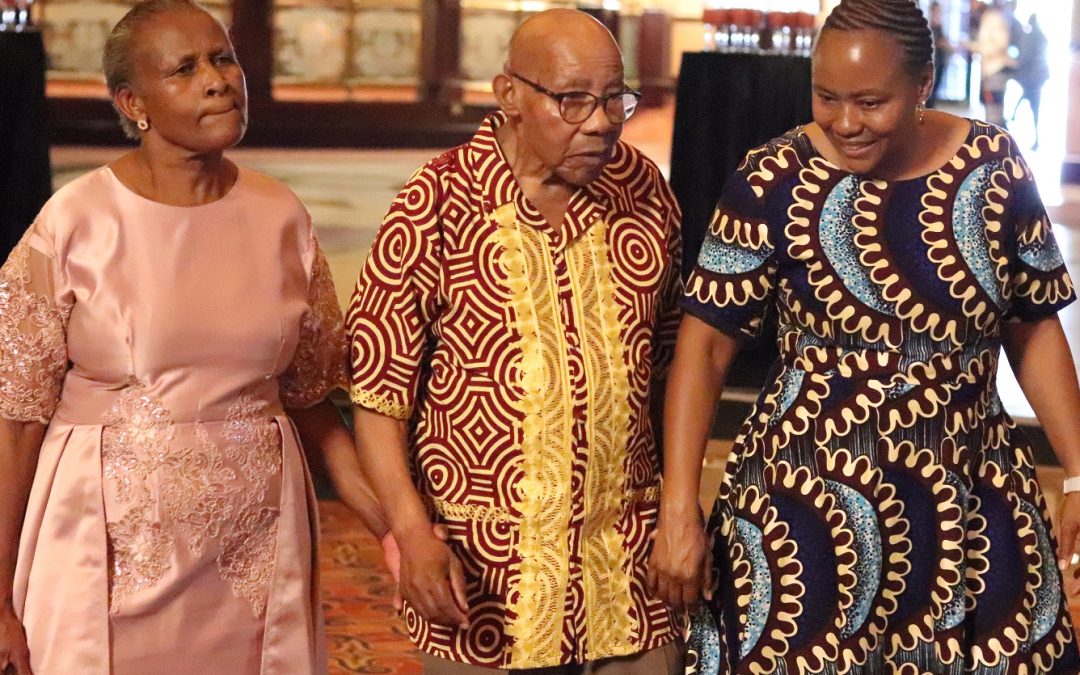
by Lorato | Feb 17, 2026 | All News, Alumni, SMU Media, Student Media
Sefako Makgatho Health Sciences University (SMU) proudly joined the Professor Ephraim Thibedi Mokgokong Foundation in celebrating the 92nd birthday of Professor Ephraim Thibedi Mokgokong at Carousel Casino. The celebration brought together alumni, healthcare professionals, academics, faith leaders and community members to honour a man whose leadership helped shape the trajectory of health sciences education in South Africa.
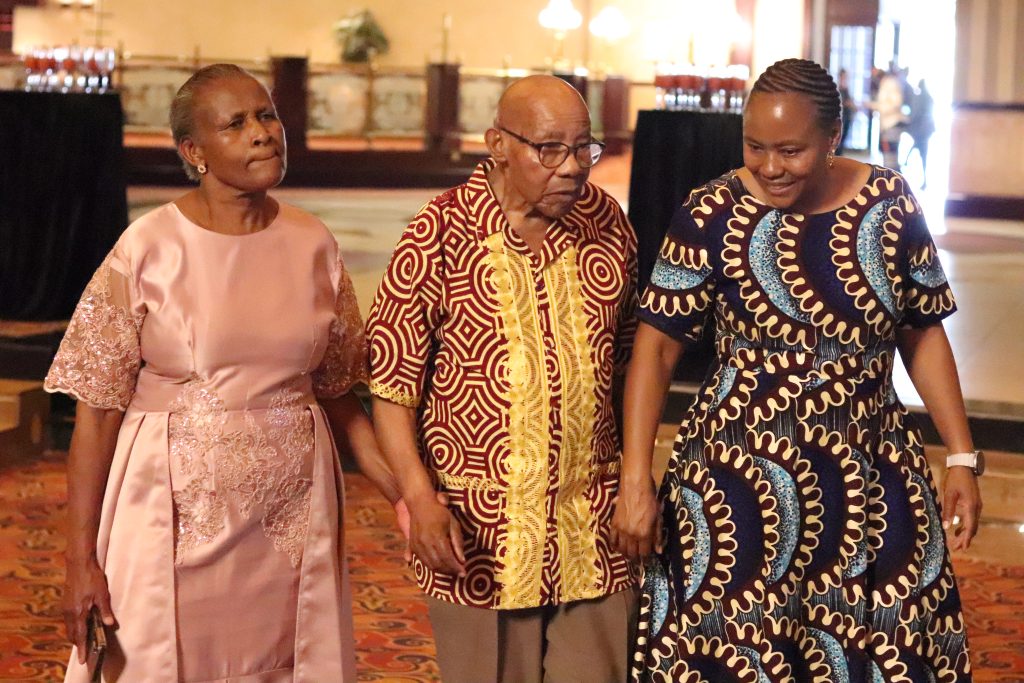 Professor Mokgokong’s legacy is deeply rooted in the institution formerly known as Medical University of Southern Africa (MEDUNSA). In 1990, he was appointed Vice-Principal, and in 1992 he became the first African/Black Vice-Chancellor and Principal of the university. His appointment marked a historic moment during South Africa’s transition period and signalled a new era of inclusive leadership in higher education.
Professor Mokgokong’s legacy is deeply rooted in the institution formerly known as Medical University of Southern Africa (MEDUNSA). In 1990, he was appointed Vice-Principal, and in 1992 he became the first African/Black Vice-Chancellor and Principal of the university. His appointment marked a historic moment during South Africa’s transition period and signalled a new era of inclusive leadership in higher education.
Having joined MEDUNSA on 1 July 1978 as Head of the Department of Obstetrics and Gynaecology, Professor Mokgokong was driven by a firm commitment to equality and academic excellence. Recruited from the University of Natal, where he served as Senior Specialist, Lecturer and the first Dean of Students, he was guided by a simple yet powerful principle: “If there are black students who have to be taught, I will go there and ensure that they are taught the same curriculum like others.”
Under his leadership, MEDUNSA experienced unprecedented growth in the enrolment and graduation of black health professionals. This era became known as the “Mokgokong wave” — a period characterised by expanded access, strengthened academic standards and renewed confidence in the institution’s ability to produce world-class professionals. He worked diligently within Senate structures, often as the only African member, to ensure that MEDUNSA’s curriculum met the highest standards nationally and internationally.
The celebration also acknowledged the historical challenges he confronted. At a time when apartheid policies restricted black students’ access to institutions such as the University of the Witwatersrand, MEDUNSA became a critical site of opportunity. Professor Mokgokong navigated institutional resistance and political tensions with courage, always prioritising the quality and credibility of the university’s qualifications.
Among those who delivered tributes was SMU alumnus Dr Zakes Kagiso Motene, a prominent medical doctor, author and entrepreneur. He reflected on Professor Mokgokong’s broader vision of health, including his passion for veterinary sciences.
“Professor Mokgokong believed that health is interconnected,” said Dr Motene. “His wish has always been for SMU to reintroduce Veterinary Sciences so that we can strengthen the country’s health system in a holistic way.”
Veterinary Science was previously offered at MEDUNSA before the Faculty was incorporated into the University of Pretoria in 1999. Today, the University of Pretoria remains the only institution in South Africa offering the BVSc degree.
Pastor Luke Dikgale also delivered a heartfelt message, describing Professor Mokgokong as “a servant leader whose humility equals his intellect.” He emphasised that beyond his academic achievements, it is the Professor’s integrity, compassion and faith-driven leadership that have left a lasting impression on generations.
Adding to the reflections, SMU Senior Alumni Officer Benedict Masenamela highlighted the importance of such gatherings in strengthening alumni relations.
“These kinds of events bring together SMU alumni from different generations and disciplines,” said Masenamela. “It is important for our alumni to keep reconnecting with the university and with one another.”
He further noted that SMU is actively working to rebuild and strengthen its alumni network. “The University is currently on a drive to reconnect and make contact with all its alumni. Our graduates are our ambassadors, and maintaining those relationships is vital for institutional growth and development,” he said.
The 92nd birthday celebration of Professor Mokgokong therefore became more than a personal milestone; it served as a powerful reunion of the MEDUNSA and SMU community. It reminded attendees of the values that shaped the institution — resilience, excellence, service and unity.
As SMU continues to advance its mandate of training socially responsive health professionals, the life and legacy of Professor Ephraim Thibedi Mokgokong remain a guiding light. His enduring impact challenges the university community to rekindle the spirit of the “Mokgokong wave” and to carry forward his vision of equitable, high-quality health sciences education for all.
By Dimakatso Modise
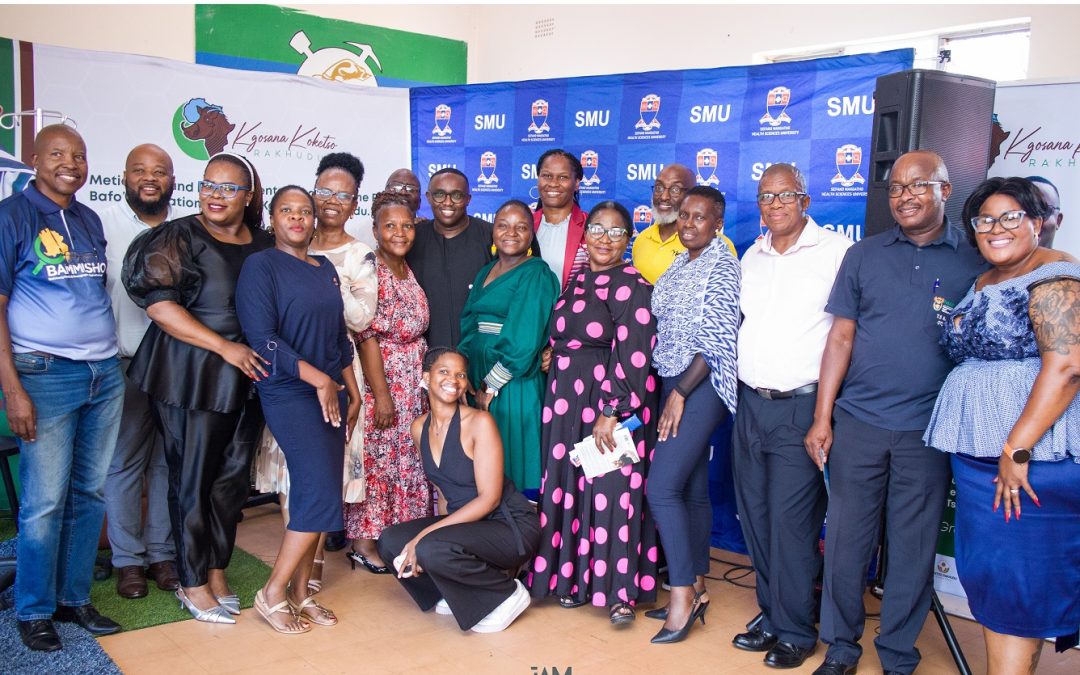
by Lorato | Feb 15, 2026 | Accolades and Achievements, All News, Alumni, SMU Media, Student Media
Sefako Makgatho Health Sciences University (SMU) reaffirmed its institutional leadership in community-centred health development during the Health Sector Stakeholders Summit held from 10 to 13 February 2026 under the theme “Strategic Collaboration for Sustainable Health Outcomes.” The four-day convergence brought together traditional authorities, government representatives, private sector companies, academics, health practitioners and community stakeholders in a unified effort to strengthen health systems, advance wellness and stimulate socio-economic progress in Tsitsing and neighbouring villages.
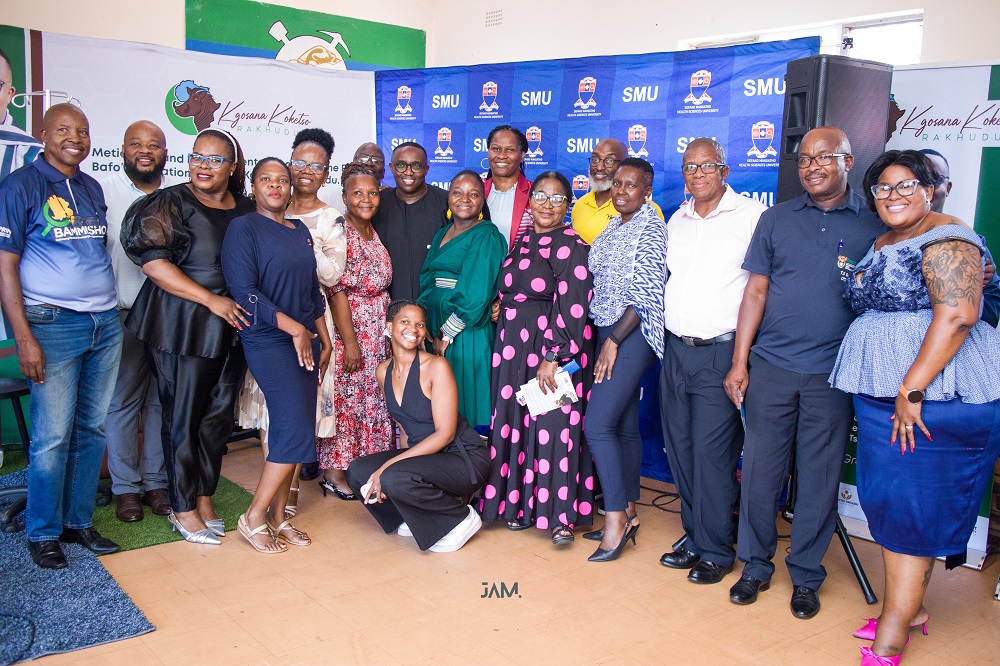 The summit coincided with the official launch of the Botsogo, Bophelo le Boitekanelo Summit 2026 by Kgosana Koketso Rakhudu of the Kgotla Ya Rakhudu, marking the commencement of a transformative partnership between traditional leadership and the university. In his opening address, Kgosana Rakhudu described the gathering as a watershed moment in the community’s developmental trajectory. “This summit represents hope translated into action,” he asserted. “It unites leadership, academia, business and the community in a shared commitment to improving health outcomes and securing a sustainable future for our villages.”
The summit coincided with the official launch of the Botsogo, Bophelo le Boitekanelo Summit 2026 by Kgosana Koketso Rakhudu of the Kgotla Ya Rakhudu, marking the commencement of a transformative partnership between traditional leadership and the university. In his opening address, Kgosana Rakhudu described the gathering as a watershed moment in the community’s developmental trajectory. “This summit represents hope translated into action,” he asserted. “It unites leadership, academia, business and the community in a shared commitment to improving health outcomes and securing a sustainable future for our villages.”
Anchored in a collaborative framework that integrates traditional leadership structures, government departments, academic institutions, non-governmental organisations, corporate partners and community formations, the initiative seeks to position Tsitsing as a demonstrative site for community-based health innovation. The active involvement of several companies underscored the growing recognition that sustainable health development requires public–private partnerships capable of mobilising financial resources, technical expertise and innovation. Through coordinated planning, evidence-driven research, capacity development and sustainable interventions, stakeholders aim to fortify primary healthcare systems, enhance service delivery efficiencies and generate enduring socio-economic dividends.
During the Stakeholder Pledge and Closing Remarks session, SMU formalised its commitment to the partnership, underscoring its enduring mandate of socially responsive scholarship. Representing the institution was Professor Mathildah Mokgatle, Head of the Department of Public Health. Prof. Mokgatle articulated the university’s conviction that sustainable transformation emerges from authentic collaboration across sectors. “As a university dedicated to advancing public health, we recognise that meaningful change occurs when institutions, business and communities work in concert,” she said. “SMU commits to supporting this ongoing partnership to strengthen local health systems and improve sustainable health outcomes.”
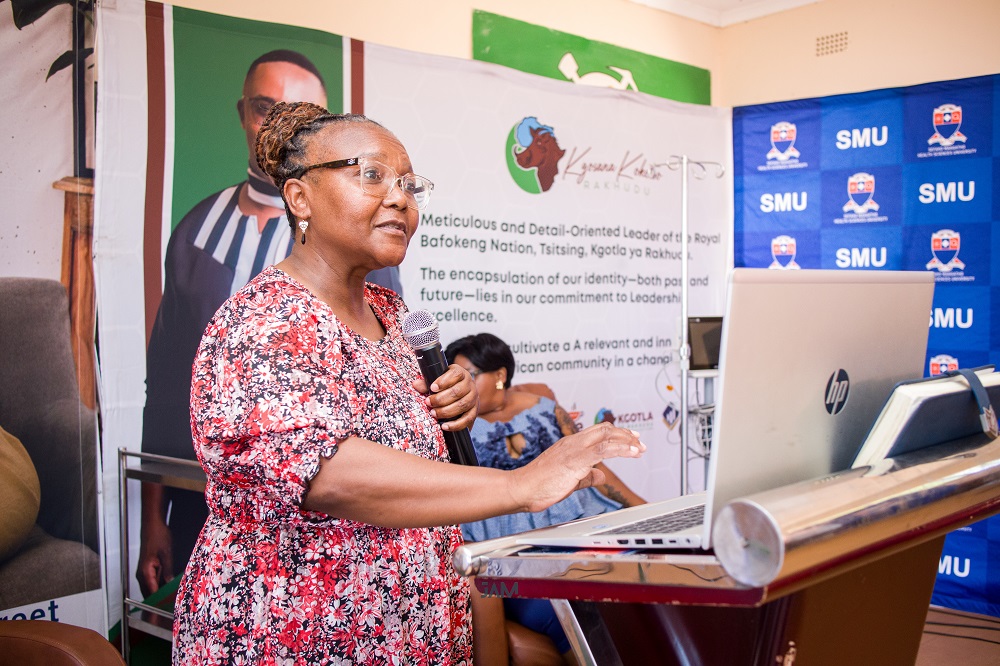 She further emphasised that the initiative would serve as a dynamic platform for community-based research, experiential student training and contextually relevant, evidence-based interventions. “Our responsibility transcends classroom instruction,” Prof. Mokgatle noted. “We must ensure that our research, training and service are intrinsically aligned with the lived realities of communities such as Tsitsing, thereby contributing directly to their health, dignity and overall wellbeing.”
She further emphasised that the initiative would serve as a dynamic platform for community-based research, experiential student training and contextually relevant, evidence-based interventions. “Our responsibility transcends classroom instruction,” Prof. Mokgatle noted. “We must ensure that our research, training and service are intrinsically aligned with the lived realities of communities such as Tsitsing, thereby contributing directly to their health, dignity and overall wellbeing.”
A defining feature of the summit was the unveiling of the 3B’s conceptual framework — Botsogo, Bophelo le Boitekanelo — spearheaded by Evah Molapisi, Lecturer in Community Physiotherapy and Rehabilitation at SMU. Molapisi elucidated that the framework encapsulates an integrated vision of health, life and holistic wellness as interdependent pillars of community advancement. “Botsogo speaks to health, Bophelo to life, and Boitekanelo to comprehensive wellness,” she explained. “These principles remind us that health is not merely the absence of illness, but the presence of empowerment, opportunity and human dignity.”
The 3B’s vision aspires to cultivate sustainable community–academic partnerships, advance Sustainable Development Goal 3 on Good Health and Well-being, stimulate youth participation in health professions and establish a viable community-based platform for student training and service delivery. By embedding academic expertise within community contexts while drawing on the innovation and support of corporate stakeholders, the initiative seeks to bridge the divide between theory and practice, ensuring that scholarship translates into measurable social impact.
Complementing the health systems discourse, Moagisi Edwin Seleka, Senior Lecturer and Head of Department at SMU, contributed a reflective exploration of the therapeutic dimensions of arts and bibliotherapy. Dr Seleka illuminated the intricate interrelationship between mental and physical health, underscoring the physiological benefits of creative engagement. “The body and mind function synergistically,” he observed. “Music and humour stimulate the release of endorphins, thereby alleviating pain and mitigating stress.”
Expanding on the transformative potential of reading and artistic expression, he added, “To read is to journey beyond one’s immediate circumstances; it is to encounter new perspectives and possibilities. Creative expression enlarges the imagination, fosters emotional resilience and facilitates psychological restoration.” His insights reinforced the summit’s holistic orientation, recognising that sustainable health outcomes necessitate attention to both corporeal and psychosocial dimensions of wellbeing.
As proceedings concluded, the Health Sector Stakeholders Summit emerged as a seminal platform for structured, long-term collaboration. By harmonising academic rigour, traditional governance, corporate participation and community engagement, the initiative presents a replicable model for inclusive, sustainable health development. Through its active involvement and formal pledge, Sefako Makgatho Health Sciences University has once again demonstrated its unwavering commitment to advancing equitable health outcomes and fostering resilient communities across South Africa.
By Dimakatso Modise
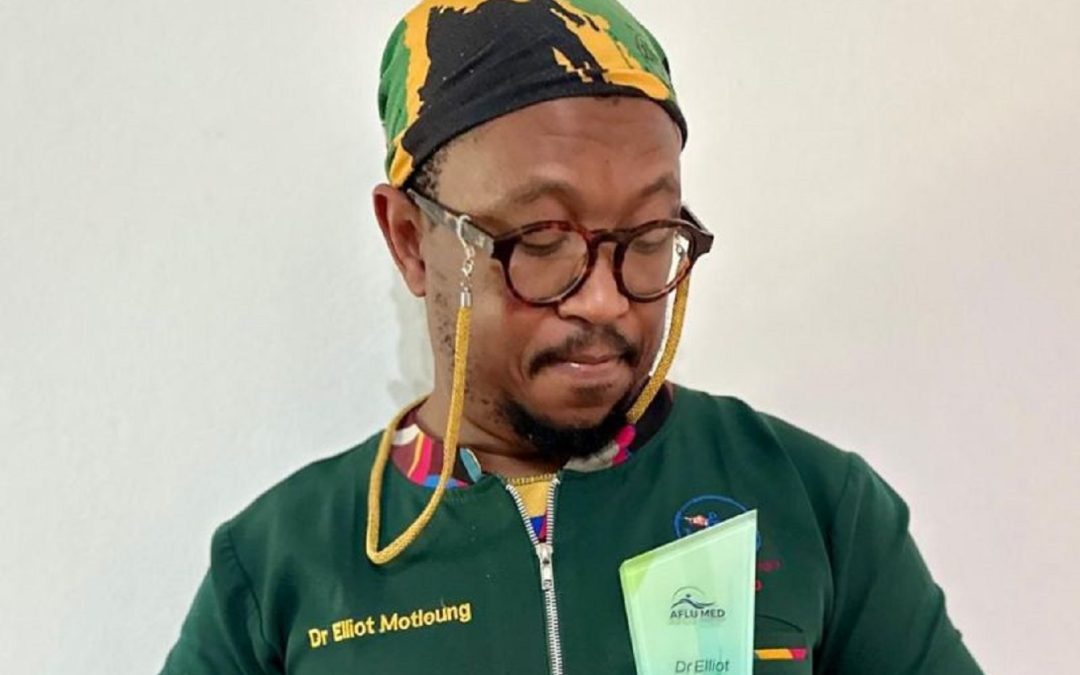
by Lorato | Feb 5, 2026 | Accolades and Achievements, All News, Alumni, SMU Media, Student Media
Aflu Med Healthcare has named Dr Elliot Motloung, Head of the Department of Paediatric Surgery at Sefako Makgatho Health Sciences University (SMU), as its 2025 Digital Healthcare Champion, recognising a clinician whose work is changing how paediatric surgery is taught, delivered and accessed across South Africa.
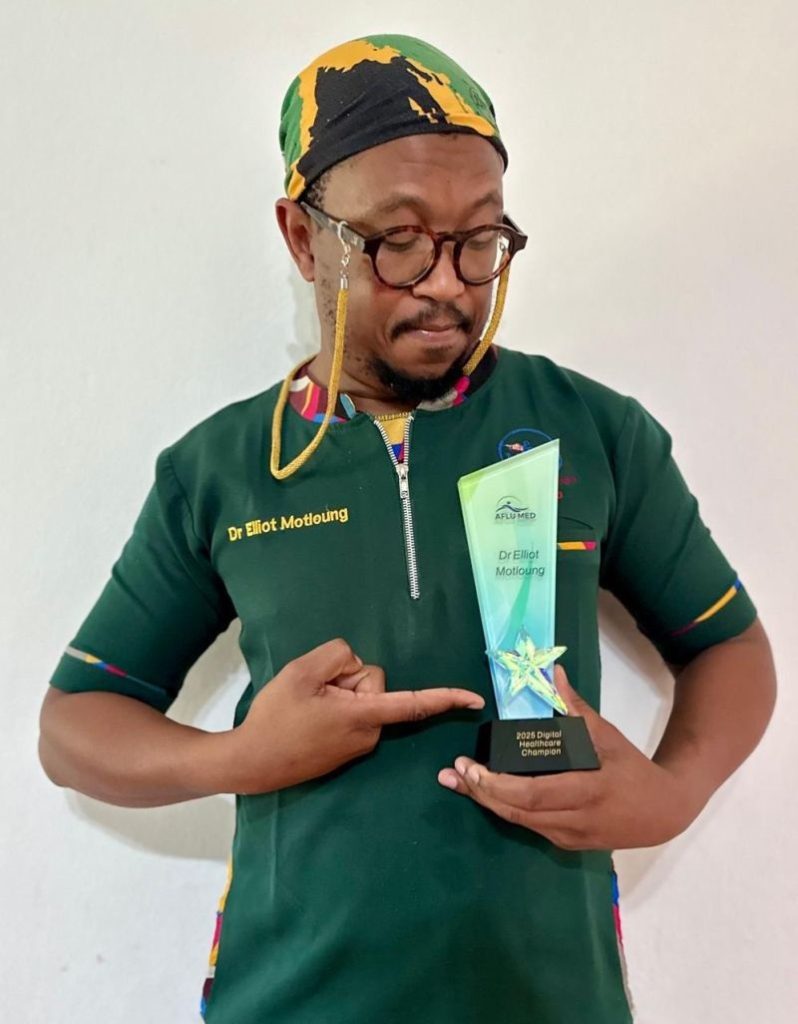 The award celebrates leadership that converts innovation into real-world impact. Dr Motloung’s career does exactly that. Known for decisive action in high-stakes clinical environments, he has built a body of work guided by a clear conviction: healthcare must be excellent, equitable and built for the future.
The award celebrates leadership that converts innovation into real-world impact. Dr Motloung’s career does exactly that. Known for decisive action in high-stakes clinical environments, he has built a body of work guided by a clear conviction: healthcare must be excellent, equitable and built for the future.
Aflu Med Healthcare is a South African health-technology company delivering integrated digital and mobile solutions to improve healthcare delivery and access. Its HealthSpace Ecosystem provides a centralised electronic health record and practice management platform that supports telehealth, clinical workflows, patient engagement, and data-driven decision-making. The company also offers business development support to healthcare providers and deploys mobile clinics that extend primary healthcare and outreach services into underserved communities.
At the centre of Dr Motloung’s impact is surgical education. He pioneered South Africa’s first Neonatal Surgical Skills Course, developed in partnership with the University of Oxford. Using simulation-based training, the programme equips surgeons with critical neonatal skills before they enter the operating theatre.
“In neonatal surgery, preparation is everything,” Dr Motloung said. “Simulation allows surgeons to build confidence and competence without placing patients at risk. That shift saves lives.”
The course has set a new national benchmark, enhancing patient safety in a discipline where the margin for error is razor-thin.
Access to care is another defining pillar of his work. Determined that geography should not dictate survival, Dr Motloung played a key role in establishing public paediatric surgical units in underserved provinces, including Limpopo and Mpumalanga. These facilities have reduced the burden on families who previously travelled long distances for specialist treatment.
“No child should suffer because care is too far away,” he said. “Bringing services closer to communities changes outcomes—and dignity.”
Clinically, Dr Motloung is widely respected for his expertise in minimally invasive thoraco-abdominal surgery, paediatric trauma and advanced laparoscopic techniques. These approaches reduce pain, shorten hospital stays and speed up recovery—critical benefits for children and overstretched health systems alike.
What truly distinguishes Dr Motloung, however, is his purpose. Shaped by first-hand exposure to healthcare inequity, his mission is rooted in service to rural and marginalised communities. He has translated that commitment into a clear, scalable blueprint for paediatric surgical care that reaches beyond urban centres.
Alongside his clinical leadership, he is an influential academic mentor. Through structured training programmes and hands-on supervision, he is developing the next generation of paediatric surgeons, strengthening surgical capacity nationally and regionally.
“Training people is how impact multiplies,” Dr Motloung said. “If we invest in skills today, patients benefit for decades.”
In naming Dr Motloung as the 2025 Digital Healthcare Champion, Aflu Med Healthcare recognises a leader who does not merely respond to change—he drives it. His work continues to raise standards, inspire clinicians and reshape health systems, proving that true progress in healthcare is measured not by innovation alone, but by lives improved and futures secured.
By Tumelo Moila
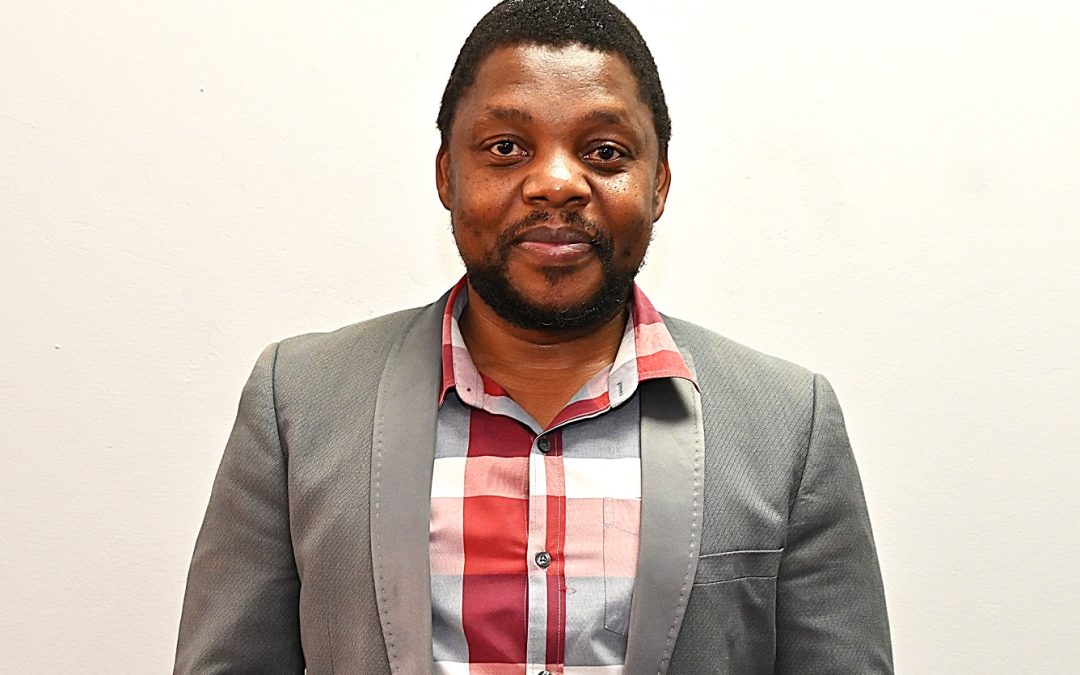
by Lorato | Jan 30, 2026 | Accolades and Achievements, All News, Alumni, SMU Media, Student Media
Sefako Makgatho Health Sciences University (SMU) continues to strengthen its research footprint on the global stage, as two of its distinguished chemistry professors—Professor Tshwafo Motaung and Professor Phumlani Mdluli—take the helm as Guest Editors of a Hot Topic Collection in Springer Nature’s Discover Applied Sciences. The newly launched Collection, Chemistry: Sustainable Materials and Circular Economy: Innovations in Biomass, Water Treatment, and Renewable Energy, is now open for submissions until 31 August 2026.
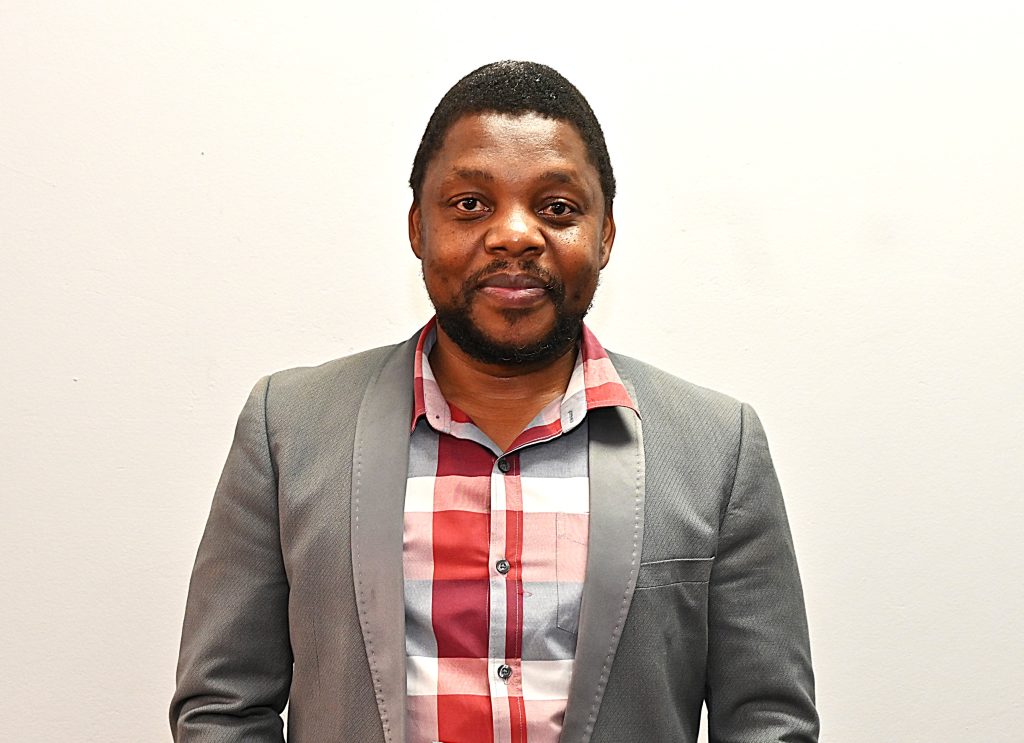 Both professors bring deep expertise and bold research visions to a platform read by hundreds of thousands of researchers worldwide. Their leadership elevates SMU’s profile while guiding a global discussion on how applied chemistry can deliver real environmental solutions.
Both professors bring deep expertise and bold research visions to a platform read by hundreds of thousands of researchers worldwide. Their leadership elevates SMU’s profile while guiding a global discussion on how applied chemistry can deliver real environmental solutions.
Professor Motaung, an expert in organic polymer chemistry, nanocomposites, and waste-stream innovation, emphasised the urgency of the work ahead. “We cannot afford slow science in a fast-changing world,” he said. “Our goal is simple: convert knowledge into innovations that make a measurable difference to people, industries, and the environment.” Known for his commitment to translating scientific and indigenous knowledge into high-impact solutions, he believes Africa has a critical role to play in global sustainability efforts.
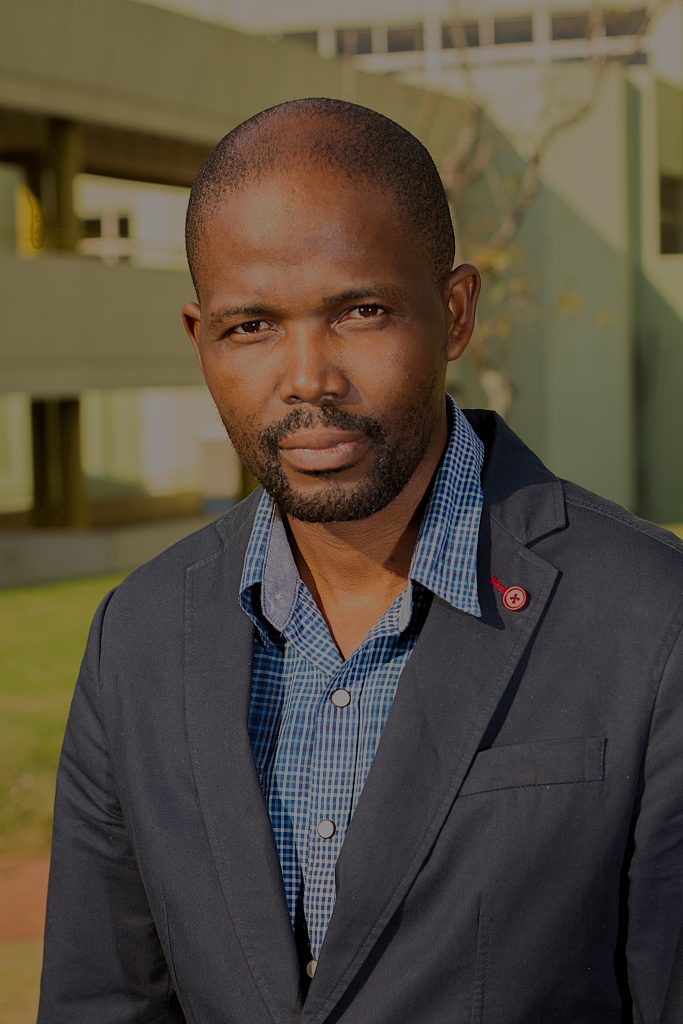 Professor Mdluli, whose research focuses on nanomaterials for diagnostics, water treatment, and renewable energy, highlighted the Collection’s emphasis on practical relevance. “This isn’t just about publishing research—it’s about accelerating technologies that can be deployed in real communities,” he explained. “Chemistry has the power to reshape how we use resources, recover waste, and build a circular economy.” He added that integrating molecular modelling into applied research will help scientists design smarter, more efficient materials.
Professor Mdluli, whose research focuses on nanomaterials for diagnostics, water treatment, and renewable energy, highlighted the Collection’s emphasis on practical relevance. “This isn’t just about publishing research—it’s about accelerating technologies that can be deployed in real communities,” he explained. “Chemistry has the power to reshape how we use resources, recover waste, and build a circular economy.” He added that integrating molecular modelling into applied research will help scientists design smarter, more efficient materials.
Springer Nature has welcomed the collaboration, noting the important stewardship role played by editors. Yidan Xu, Managing Editor at Discover Applied Sciences, said: “Editors are the guardians of quality. We rely on experts like Professors Tshwafo and Mdluli to uphold rigorous standards and guide impactful research to publication. Their leadership strengthens the trust our authors and readers place in us.”
The Hot Topic Collection arrives at a crucial moment. As nations face mounting pressure from climate change, water scarcity, and energy demand, applied chemistry offers a pathway to scalable, science-driven solutions. The Collection spotlights innovations in biomass utilisation, pollutant degradation, polymer and composite development, catalytic materials, and pilot-scale demonstrations that bridge laboratory discoveries with industry and community application.
By emphasising translational value, the Collection seeks to inspire work that delivers real-world impact. It also contributes to several United Nations Sustainable Development Goals, including SDG 6 (Clean Water and Sanitation), SDG 7 (Affordable and Clean Energy) and SDG 9 (Industry, Innovation and Infrastructure).
Discover Applied Sciences—a multidisciplinary open-access journal with more than 4.9 million downloads in 2024—offers rapid processing, with a median submission-to-decision time of just 14 days. Researchers contributing to the Collection will benefit from high visibility and a global readership.
As Motaung concluded, “This is more than a scholarly Collection—it’s a call to action for chemists worldwide.”
By Tumelo Moila
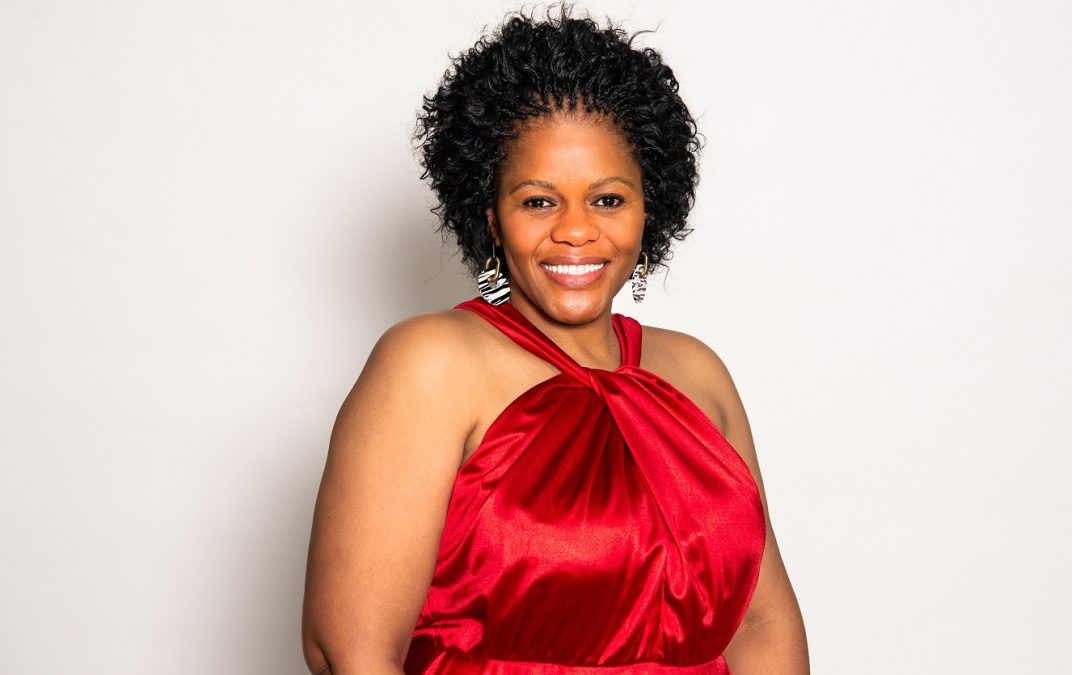
by Lorato | Jan 15, 2026 | All News, Alumni, SMU Media, Student Media
In the evolving world of healthcare education, few stories capture both global leadership and local impact as powerfully as that of Khomotso Paulina Motiang, a Lecturer in the Department of Radiography at Sefako Makgatho Health Sciences University (SMU). From global forums to SMU lecture halls, Motiang is redefining what it means to lead in radiography, using her platform to inspire change, develop young professionals, and advance MRI education in South Africa and beyond.
 With a clinical career spanning public and private sectors, international experience, and more than five years in academia, her greatest influence is now felt in academia, where she nurtures future radiographers to lead with both skill and compassion. “We must remain human while striving for excellence,” she reflects, a principle that shapes every dimension of her work.
With a clinical career spanning public and private sectors, international experience, and more than five years in academia, her greatest influence is now felt in academia, where she nurtures future radiographers to lead with both skill and compassion. “We must remain human while striving for excellence,” she reflects, a principle that shapes every dimension of her work.
In 2024, Motiang’s commitment to transformation was recognised when she was awarded the International Society of Magnetic Resonance Radiographers and Technologists (ISMRT) Future Leaders Fellowship, an initiative developed in partnership with the Bill & Melinda Gates Foundation. This prestigious global fellowship positions her at the forefront of MRI education advancement in underserved regions. For South Africa’s radiography community, it is a milestone: Motiang is not only representing the country on global platforms but bringing global innovation back home.
Through the Fellowship, she is establishing the ISMRT South African Division, creating a national knowledge-sharing hub for MRI safety and best practice. “This Fellowship is not just personal, it’s a resource for the profession and a tool to empower others,” Motiang says.
At SMU, her teaching philosophy is equally progressive. She champions interprofessional education and collaborative practice (IPECP), believing that modern radiographers must operate beyond their specialisation and work as collaborative healthcare leaders. Her supervision of undergraduate research projects in forensic imaging and AI in diagnostics demonstrates her commitment to producing forward-thinking graduates ready for global healthcare environments.
Her leadership extends to national structures: from 2025 to 2029, she will serve as the Gauteng Provincial Representative for the Society of Radiographers of South Africa (SORSA), shaping national policy and professional development. Internationally, she continues to advocate for MRI safety and education through her Fellowship, and as a Fellow of the ISMRT.
Yet, Motiang’s leadership philosophy remains rooted in human connection. Beyond accolades and fellowships, she quietly donates food parcels to students in need and mentors first-generation university entrants. “Support doesn’t always come from policy. Sometimes it comes from people choosing to care.”
Her work embodies SMU’s vision: health sciences education that is both locally relevant and globally competitive. As a reviewer for the African Journal of Health Professions Education, Motiang advocates for African research that reflects the continent’s realities while contributing to global knowledge. From global MRI forums to the students she mentors daily, Motiang is a leader of substance, one who proves that advancing healthcare is not just about technology and systems, but about people, compassion, and vision.
A global voice and a local heart, she is redefining radiography leadership for South Africa and for the world.
By Tumelo Moila
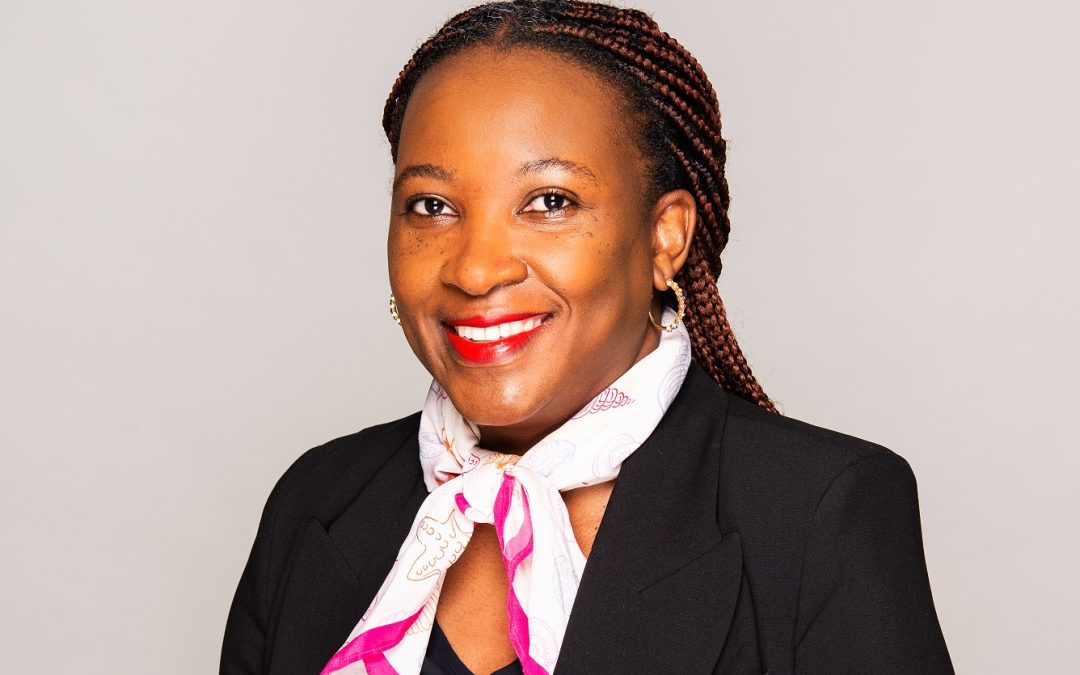
by Lorato | Jan 11, 2026 | All News, Alumni, SMU Media, Student Media
Dr Ramokone Maphoto, Senior Pathologist in Virology at Sefako Makgatho Health Sciences University (SMU) and the National Health Laboratory Service (NHLS), stands as a key figure in South Africa’s ongoing battle against HIV/AIDS. With a career built on scientific excellence and a commitment to public health, Maphoto is making significant contributions to diagnostics, research, and community empowerment.
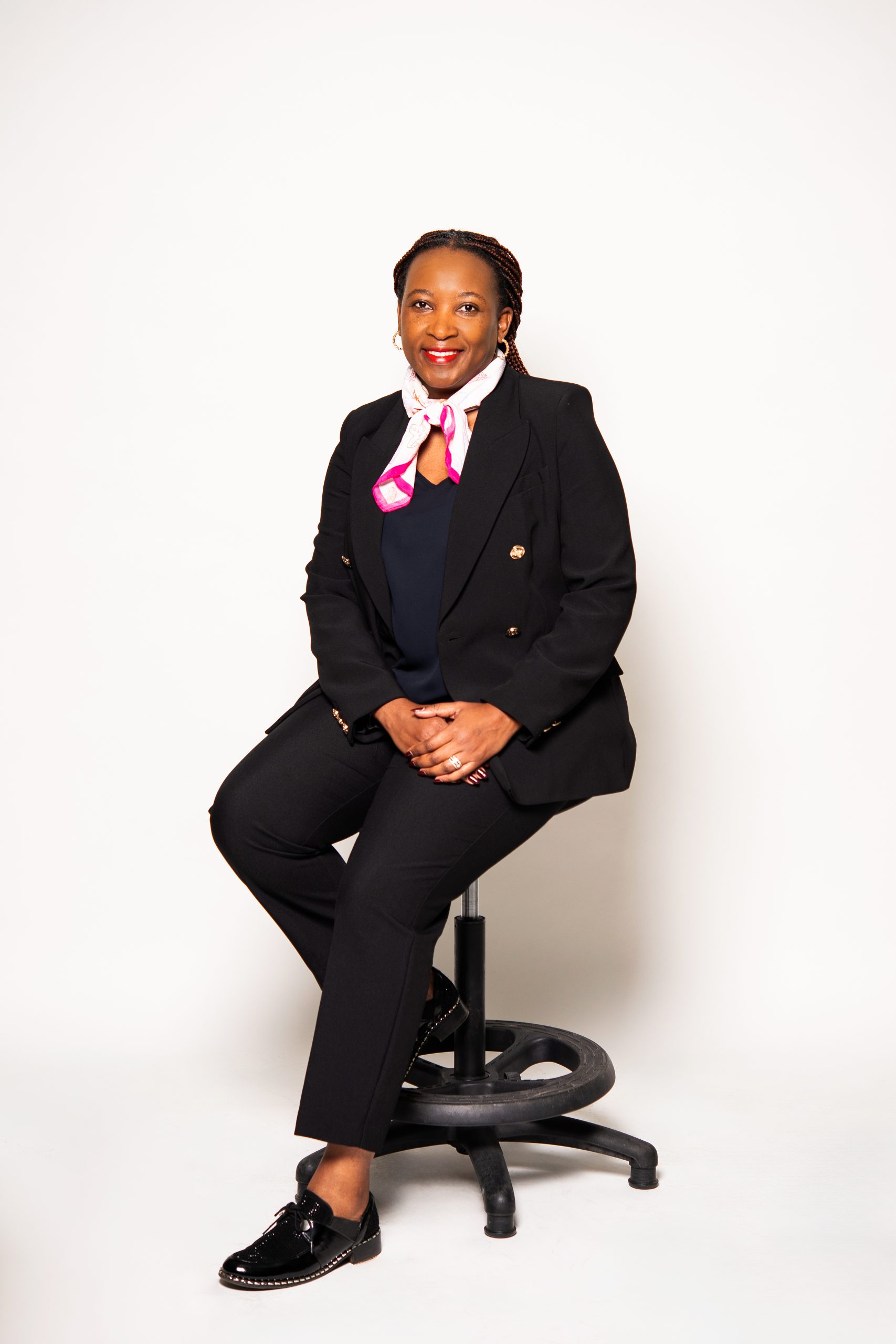 Based within SMU’s Department of Virology, Maphoto’s work spans cutting-edge laboratory science and practical healthcare solutions. She currently leads the Clinical Virology Research Unit, a newly established facility dedicated to advancing the understanding of viral infections. The unit’s mandate focuses on diagnostics, treatment, prevention, and innovative research that integrates laboratory findings with clinical application.
Based within SMU’s Department of Virology, Maphoto’s work spans cutting-edge laboratory science and practical healthcare solutions. She currently leads the Clinical Virology Research Unit, a newly established facility dedicated to advancing the understanding of viral infections. The unit’s mandate focuses on diagnostics, treatment, prevention, and innovative research that integrates laboratory findings with clinical application.
“Science is not only about discovery but about making a real impact on people’s lives,” says Maphoto. “At SMU, we’re uniquely positioned to bridge laboratory research and frontline healthcare, especially in addressing HIV/AIDS challenges.”
Her role also extends to academic leadership as an active member of the Departmental Research Committee, where she serves as Deputy Chair on rotation. This involvement allows her to influence the strategic direction of virology research and foster collaboration among researchers and clinicians.
SMU’s Virology Department plays a critical role in South Africa’s health system, providing essential HIV testing and treatment monitoring services to vulnerable communities. Under Maphoto’s guidance, the laboratory operates around the clock, utilising advanced automated HIV testing technologies to increase capacity and deliver timely, accurate results.
“Timely viral load testing is essential for managing treatment effectively,” explains Maphoto. “It helps detect treatment failure early, ensuring patients receive appropriate care to suppress the virus and reduce transmission.”
Beyond the lab, Maphoto is passionate about education and capacity building. She mentors and trains medical registrars, honours, and master’s students, nurturing the next generation of virologists who will continue to strengthen South Africa’s HIV response.
However, Maphoto recognises that the fight against HIV/AIDS is about more than medicine and technology. Stigma remains a significant barrier to care, and she is dedicated to community outreach and education initiatives that challenge misconceptions and encourage people to seek testing and treatment.
“Breaking down stigma is critical,” she asserts. “Education empowers people to make informed decisions and access the healthcare they need without fear or shame.”
Maphoto’s work exemplifies the integration of scientific innovation, public health commitment, and compassionate leadership. Her efforts not only enhance diagnostic services but also shape policy and practice, supporting South Africa’s goal of ending the HIV epidemic.
“At SMU, we believe in health equity as a responsibility,” she says. “I’m proud to contribute to this mission by advancing research and ensuring every patient’s right to quality care is respected.”
In a country grappling with the world’s largest HIV epidemic, access to reliable testing and treatment is more critical than ever. At the heart of this fight is SMU, where science, research, and compassion converge to tackle the HIV/AIDS crisis head-on.
By Dimakatso Modise

 Professor Mokgokong’s legacy is deeply rooted in the institution formerly known as Medical University of Southern Africa (MEDUNSA). In 1990, he was appointed Vice-Principal, and in 1992 he became the first African/Black Vice-Chancellor and Principal of the university. His appointment marked a historic moment during South Africa’s transition period and signalled a new era of inclusive leadership in higher education.
Professor Mokgokong’s legacy is deeply rooted in the institution formerly known as Medical University of Southern Africa (MEDUNSA). In 1990, he was appointed Vice-Principal, and in 1992 he became the first African/Black Vice-Chancellor and Principal of the university. His appointment marked a historic moment during South Africa’s transition period and signalled a new era of inclusive leadership in higher education.

 The summit coincided with the official launch of the Botsogo, Bophelo le Boitekanelo Summit 2026 by Kgosana Koketso Rakhudu of the Kgotla Ya Rakhudu, marking the commencement of a transformative partnership between traditional leadership and the university. In his opening address, Kgosana Rakhudu described the gathering as a watershed moment in the community’s developmental trajectory. “This summit represents hope translated into action,” he asserted. “It unites leadership, academia, business and the community in a shared commitment to improving health outcomes and securing a sustainable future for our villages.”
The summit coincided with the official launch of the Botsogo, Bophelo le Boitekanelo Summit 2026 by Kgosana Koketso Rakhudu of the Kgotla Ya Rakhudu, marking the commencement of a transformative partnership between traditional leadership and the university. In his opening address, Kgosana Rakhudu described the gathering as a watershed moment in the community’s developmental trajectory. “This summit represents hope translated into action,” he asserted. “It unites leadership, academia, business and the community in a shared commitment to improving health outcomes and securing a sustainable future for our villages.” She further emphasised that the initiative would serve as a dynamic platform for community-based research, experiential student training and contextually relevant, evidence-based interventions. “Our responsibility transcends classroom instruction,” Prof. Mokgatle noted. “We must ensure that our research, training and service are intrinsically aligned with the lived realities of communities such as Tsitsing, thereby contributing directly to their health, dignity and overall wellbeing.”
She further emphasised that the initiative would serve as a dynamic platform for community-based research, experiential student training and contextually relevant, evidence-based interventions. “Our responsibility transcends classroom instruction,” Prof. Mokgatle noted. “We must ensure that our research, training and service are intrinsically aligned with the lived realities of communities such as Tsitsing, thereby contributing directly to their health, dignity and overall wellbeing.”
 The award celebrates leadership that converts innovation into real-world impact. Dr Motloung’s career does exactly that. Known for decisive action in high-stakes clinical environments, he has built a body of work guided by a clear conviction: healthcare must be excellent, equitable and built for the future.
The award celebrates leadership that converts innovation into real-world impact. Dr Motloung’s career does exactly that. Known for decisive action in high-stakes clinical environments, he has built a body of work guided by a clear conviction: healthcare must be excellent, equitable and built for the future.
 Both professors bring deep expertise and bold research visions to a platform read by hundreds of thousands of researchers worldwide. Their leadership elevates SMU’s profile while guiding a global discussion on how applied chemistry can deliver real environmental solutions.
Both professors bring deep expertise and bold research visions to a platform read by hundreds of thousands of researchers worldwide. Their leadership elevates SMU’s profile while guiding a global discussion on how applied chemistry can deliver real environmental solutions. Professor Mdluli, whose research focuses on nanomaterials for diagnostics, water treatment, and renewable energy, highlighted the Collection’s emphasis on practical relevance. “This isn’t just about publishing research—it’s about accelerating technologies that can be deployed in real communities,” he explained. “Chemistry has the power to reshape how we use resources, recover waste, and build a circular economy.” He added that integrating molecular modelling into applied research will help scientists design smarter, more efficient materials.
Professor Mdluli, whose research focuses on nanomaterials for diagnostics, water treatment, and renewable energy, highlighted the Collection’s emphasis on practical relevance. “This isn’t just about publishing research—it’s about accelerating technologies that can be deployed in real communities,” he explained. “Chemistry has the power to reshape how we use resources, recover waste, and build a circular economy.” He added that integrating molecular modelling into applied research will help scientists design smarter, more efficient materials.
 With a clinical career spanning public and private sectors, international experience, and more than five years in academia, her greatest influence is now felt in academia, where she nurtures future radiographers to lead with both skill and compassion. “We must remain human while striving for excellence,” she reflects, a principle that shapes every dimension of her work.
With a clinical career spanning public and private sectors, international experience, and more than five years in academia, her greatest influence is now felt in academia, where she nurtures future radiographers to lead with both skill and compassion. “We must remain human while striving for excellence,” she reflects, a principle that shapes every dimension of her work.
 Based within SMU’s Department of Virology, Maphoto’s work spans cutting-edge laboratory science and practical healthcare solutions. She currently leads the Clinical Virology Research Unit, a newly established facility dedicated to advancing the understanding of viral infections. The unit’s mandate focuses on diagnostics, treatment, prevention, and innovative research that integrates laboratory findings with clinical application.
Based within SMU’s Department of Virology, Maphoto’s work spans cutting-edge laboratory science and practical healthcare solutions. She currently leads the Clinical Virology Research Unit, a newly established facility dedicated to advancing the understanding of viral infections. The unit’s mandate focuses on diagnostics, treatment, prevention, and innovative research that integrates laboratory findings with clinical application.